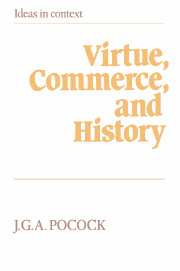 Virtue, Commerce, and History
Virtue, Commerce, and History 2 - Virtues, rights, and manners: A model for historians of political thought
Published online by Cambridge University Press: 05 May 2010
Summary
The history of political thought is traditionally deeply affected by the study of law. In recent years, however, there have been some interesting undulations and oscillations. Modes of talking about politics which were strikingly remote from the language of the law have emerged into historical prominence; and though there are signs that the historiography of political thought is now moving back into what I shall argue is the law-centered paradigm under which it has traditionally been conducted, it is an article of faith with us all that the needle does not return to its starting point, and some modification of the paradigm is therefore to be expected. The title of this article is designed to circumscribe the modification which may have occurred.
Consult any classical work on this subject – Carlyle or Sabine or Wolin – and we shall find that the history of political thought, at any rate from the Stoics to the Historicists, is organized to a very high degree around the notions of God, nature, and law. The individual is looked on as inhabiting a cosmos regulated by rational and moral principles, essential to its being, which are of the nature of nomos, and to these philosophically perceived or divinely revealed systems manmade bodies of jurisprudence are assimilated. God Himself is looked on as a lex loquens, and even His role as the author of inscrutable grace does not much detract from this image. Philosophy and faith become modes of cognizing and acknowledging law, with the result that jurisprudence gives access to all but the most sublime forms of intellectual experience.
- Type
- Chapter
- Information
- Virtue, Commerce, and HistoryEssays on Political Thought and History, Chiefly in the Eighteenth Century, pp. 37 - 50Publisher: Cambridge University PressPrint publication year: 1985
- 20
- Cited by
